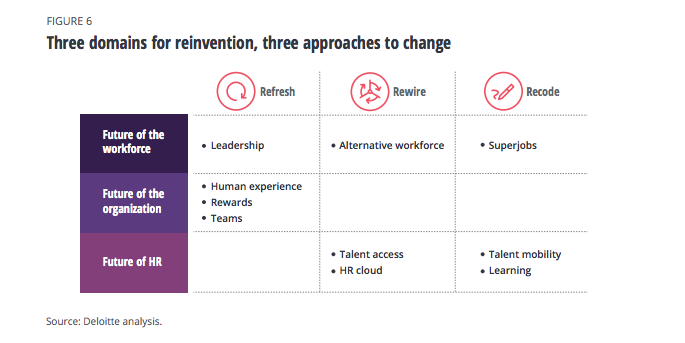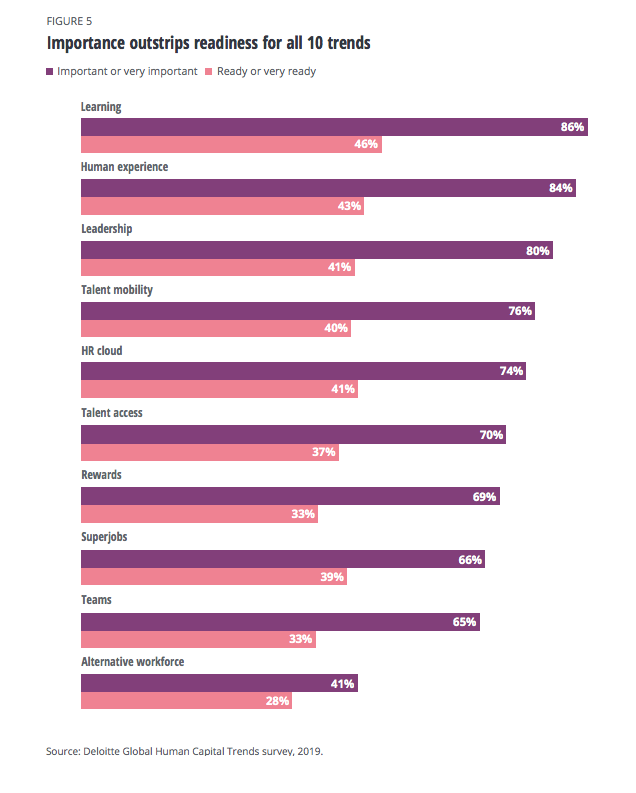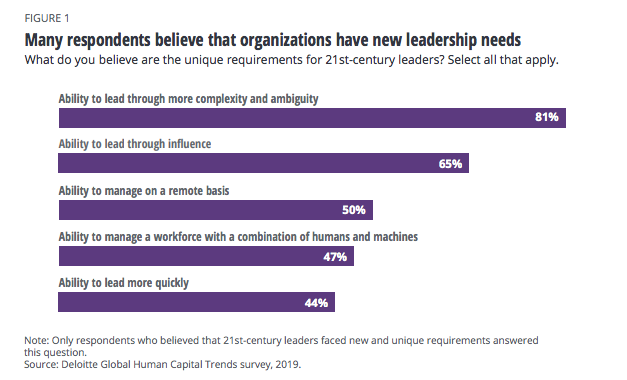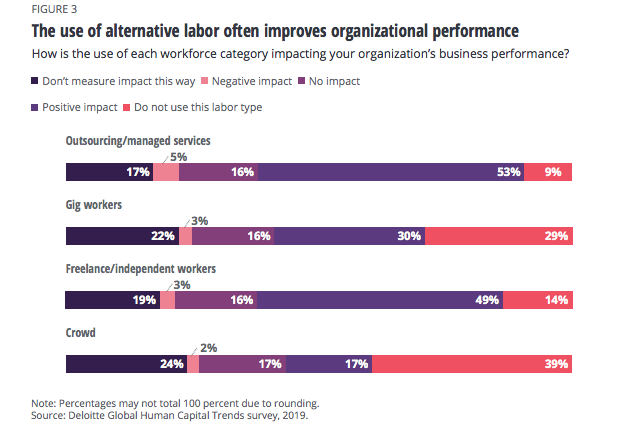Deloitte has released a new report outlining the top areas that HR managers should focus their attention on in the next year.
Most readers wouldn’t be surprised to see that the relationship between the human workforce and artificial intelligence/technology is still dominating the conversation in organisations across the globe. It’s a topic that has received a lot of airtime and some people might be feeling fatigued at the thought of yet another report showcasing just how unprepared for the future we are.
But Deloitte’s 2019 Human Capital Trends Report doesn’t do that. Based on detailed surveys with 10,000 respondents across 119 countries, it highlights some of the biggest pressure points for organisations in Australia and across the globe (yes, the AI/human relationship is one of them), while also providing actionable advice.
This advice is broken down into three phases: refresh, rewire and recode. At the end of each chapter, one of these three phases is listed with advice for organisations to follow.

Ready? Set? No.
Of the top ten trends identified by Deloitte (shown in the graph below), it’s clear that while people understand the importance of these workplace trends, and accept they will have to adapt to them, many don’t feel ready.

News ways of learning
The number one trend to come from this year’s report was reinventing the way people are learning, with 91 per cent of Australian respondents and 86 per cent of global respondents highlighting this as their top priority.
Recent data from the World Economic Forum reveals that over 50 per cent of employees will need to be either upskilled or reskilled in the next three years.
As we move on from the conversation about AI taking our jobs, 80 per cent of Australian businesses are eliminating their transactional work and replacing those roles with AI-based functions and reskilling 68 per cent of their existing workforce.
Deloitte’s report identified three broader trends to show how learning in evolving: It’s more integrated in our work, it’s more personal and it’s slowly shifting towards lifelong learning.
“With the need to sustain 50-60 year careers as part of a 100-year life, lifelong learning has evolved from a matter of career advancement to workplace survival,” says David Brown, Deloitte Human Capital lead partner.
The rise of the super jobs
For some time it was super foods that were attracting our attention, now Deloitte predicts that super jobs will be next on the list. It defines these as “jobs that combine parts of different traditional jobs into integrated roles that leverage the significant productivity and efficiency gains that can arise when people work with technology.”
When it comes to adopting automation at work, it appears Australia is ahead of the curve. Fifty-two per cent of local businesses said they utilise automation extensively across multiple functions (11 per cent higher than the global average).
The integration of AI isn’t as widespread – sitting at 35 per cent in Australia – but half of Australian businesses are thought to be exploring AI with 95 per cent understanding that it will become the lifeblood of their organisations within the next three years.
Brown says the concept of a job is fundamentally changing and this is where the concept of a super job comes in: technology that is able to enhance human input. As an example of what super jobs look like, Brown points to a controller working in a mining operations centre that remotely controls autonomous vehicles in a neighbouring town, or a doctor who uses telemedicine to operate from a remote location.
“Super-jobs are machine-powered, data-driven and require human skills in problem-solving, communication, interpretation, and design. Super-jobs will combine work and skill sets across multiple business domains, opening up opportunities for mobility, advancement and the rapid adoption of new skills desperately needed today,” says Brown.
“With the need to sustain 50-60 year careers as part of a 100-year life, lifelong learning has evolved from a matter of career advancement to workplace survival.” – David Brown
Stronger focus on purpose
The 2018 version of this report identified that 53 per cent of Australian businesses didn’t have a strong focus on social responsibility, but this year the tides have turned with 83 per cent of organisations agreeing or strongly agreeing that taking an interest in social issues is an important part of doing business in 2019.
In fact, when asked to share their most important measure of success, “impact on society, including income inequality, diversity and the environment” was the top answer to come from CEOs.
One of the key reasons organisations are preferencing social issues is because they believe it’s a good look for their employment brand, with 60 per cent citing it has a positive impact on recruitment and retention. Only a small portion (26 per cent) believe investors have interest in this space.
“The past 12 months has seen a dramatic shift in business recognition of the contribution it needs to make to society,” says Brown.
“The Financial Services Royal Commission has had a sobering effect on all types of business, with leaders recognising a need to move beyond mission statements and philanthropy and restructure their whole business to ensure they benefit society, not just shareholders.
“We see this trend continuing. Our research found that 61 per cent of Australian businesses expect social enterprise issues to be even more important three years from now.”
Creating 21st Century leaders
Eighty per cent of respondents believe that leaders of today face a unique set of challenges as they now need to take “a nuanced approach to traditional business goals” that’s suitable to the new context they’re working within. These new set of challenges include: leading through change, embracing ambiguity and understanding digital and AI-driven technology.

Deloitte found that organisations expect their leaders to embody the necessary skills to lead through the aforementioned changes, yet they are still training leaders in a way that promotes a traditional mindset and approach.
Those surveyed said the main drivers behind this new (and necessary) approach to leadership include new technologies, a change of pace, changing demographics and changing customer expectations. The report suggests that the vital elements of a refreshed leadership training strategy include: setting a new context, identifying new leadership competencies and putting the right culture in place.
It says that rather than hiring new leadership externally, businesses should look to invest more in developing their existing leaders (or up and coming leaders).
“In today’s fast-paced environment, people learn by doing – and trying,” the report reads.
To cultivate new leadership competencies, organisations can:
- Give people more diverse, developmental assignments;
- Promote people into leadership roles both earlier and later in their careers;
- Give leaders with less traditional experience the opportunity to run business initiatives; and
- Honour the ability of their workers and leaders at every level, from early to late in their careers, to rethink, challenge and develop the business they’re in.
Out of the box employees
Managing “alternative workers” (freelancers, gig workers, crowd workers) has been somewhat of a headache for some employers, but it’s definitely an important area for managers to wrap their heads around with the Bankwest Curtin Economics Centre predicting that 11.6 per cent of the Australian workforce are independent contractors (that’s 1,270,000 people).
Deloitte’s findings show that Australian businesses are more open to using this alternative workforce for IT (60 per cent) and operational roles (26 per cent) than their international counterparts (33 per cent and 25 per cent respectively), but most are haphazard in their approach towards managing transient staff.
It appears as if these staff are being utilised as Band-Aids for a bullet wound. The report suggests that a more strategic and long-term approach is necessary to engage this portion of the workforce. In order for an organisation to continue to scale up, the report says it needs to learn to effectively manage alternative workers and that means making sure you have the right employees, with the right skills, working in the right part of your organisation.
These workers can often provide great benefit to a business’ overall performance level as demonstrated by the graph below.

“For years, many considered contract, freelance, and gig employment to be ‘alternative work,’ options supplementary to full-time jobs,” says Brown.
“Today, this segment of the workforce is mainstream and leading organisations are looking strategically at all types of work arrangements in their plans for growth. Best practices to access and deploy alternative workers are only now being invented.
“Organisations should look strategically at all types of work arrangements – traditional and alternative – to redesign jobs to properly leverage strengths across all workforce segments, from gig workers to those with super-jobs.”
More from the report
Other interesting themes discussed throughout the report include the need for an increased focus on internal talent mobility, the use of HR technology and how organisations are utilising their reward and recognition systems. Here are some of the findings at a glance:
- Only 11 per cent of organisations have a rewards systems that aligns with their wider organisational goals.
- 65 per cent of organisations said their organisation is set up in a traditional hierarchical system.
- 74 per cent of respondents said HR technology was important or very important, with 21 per cent placing it in their top three most urgent topics for discussion.
- 76 per cent of C-suite executives rated internal talent mobility (moving talent around in jobs, projects, locations etc.) as important.
- 50 per cent of respondents said it was easier to gain employment outside of their organisation than internally.
- Only 18 per cent of respondents felt their organisation was transparent and open, and 27 per cent thought that lack of transparency was disadvantaging the business.
- 37 per cent were worried about their ability to cultivate trust
Read the full 2019 Deloitte Human Capital Report here.
Prepare your employees for the future of work with the Ignition Training course ‘Leading through change’.


[…] to the Australian HR Institute, 52% of local businesses have installed automation extensively across multiple functions, which is 11% […]